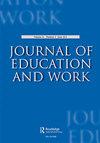Skills nomenclature: what to expect from college versus university bachelor’s degrees
IF 1.7
Q2 EDUCATION & EDUCATIONAL RESEARCH
引用次数: 0
Abstract
ABSTRACT Students invest time and money in post-secondary education to secure employment in their chosen field of study. In the past, choices were often constrained by the type of credential (college diploma or university bachelor’s degree). Albeit this decision criterion became blurred when colleges started offering bachelor’s degrees. Matriculating students now also decide which type of institution might best prepare them for their future employment. Students often look to course descriptions to select courses that can be reasonably expected to offer skills for career preparedness. But what happens when academia uses a different language to describe skills desired by employers? This study aims to understand whether colleges or universities offer a stronger lexical alignment between course descriptions and high-demand industry skills. It examines communication barriers arising from a potential linguistic misalignment of skills using a computer-assisted text-analysis tool to compare course curricula with online job postings. Findings support a general misalignment but show that course descriptions at colleges have a stronger linguistic overlap of skills demanded by industry. We discuss the implications of employing a dynamic technology-driven tool to improve the academic-industry alignment of skills nomenclature.技能命名:大学与大学学士学位的期望
摘要:学生在中学后教育中投入时间和金钱,以确保在他们选择的学习领域就业。在过去,选择往往受到证书类型(大学文凭或大学学士学位)的限制。尽管当大学开始提供学士学位时,这个决定标准变得模糊了。现在,准备结婚的学生还决定哪种类型的学校最适合他们未来的就业。学生们通常会根据课程描述来选择可以合理预期提供职业准备技能的课程。但是,当学术界用不同的语言来描述雇主想要的技能时,会发生什么呢?本研究旨在了解学院或大学是否在课程描述和高需求行业技能之间提供了更强的词汇一致性。它使用计算机辅助的文本分析工具,将课程设置与在线招聘信息进行比较,研究了由于潜在的语言技能错位而产生的沟通障碍。研究结果支持普遍的错位,但表明大学的课程描述与行业所需的技能在语言上有更强的重叠。我们讨论了使用动态技术驱动工具来改善技能命名的学术-行业一致性的含义。
本文章由计算机程序翻译,如有差异,请以英文原文为准。
求助全文
约1分钟内获得全文
求助全文
来源期刊

Journal of Education and Work
EDUCATION & EDUCATIONAL RESEARCH-
CiteScore
2.70
自引率
14.30%
发文量
40
期刊介绍:
The Journal of Education and Work is an international forum for academic research and policy analysis which focuses on the interplay of the education and economic systems. The journal examines how knowledge, skills, values and attitudes both about and for work and employment are developed within the education system. The journal also explores the various forms of industrial training and accreditation in the economic system, including changes in the economic and industrial infrastructure which influence the type of employees required. Work in the informal economy is also included.
 求助内容:
求助内容: 应助结果提醒方式:
应助结果提醒方式:


